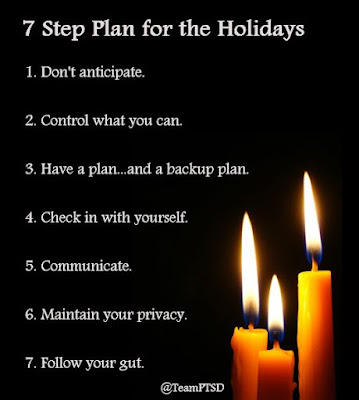Coping with Post-Traumatic Stress Disorder During the Holidaze
Coping with PTSD During the Holidaze
If you are wondering why you
have difficulty surrounding holidays and/or anniversaries of traumatic dates –
YOU ARE NOT ALONE. These dates can creep up on us and without realizing
it often weeks or more before, the trauma reaction side effects appear and intensified.
Our conscious minds do not necessarily assist us in connecting these dots, but
our subconscious most certainly does remember. Cell memory wins…
Some people love this time of year and for
some it induces flashbacks of trauma and grief, making it the most difficult
time of year. An estimated 70 percent of adults in the United
States have experienced a traumatic event at least once in their lives and
may have acute stress disorder from it. Acute stress disorder will
usually heal after 6 months from the trauma. Not all people do and up to
20% of these people go on to develop post-traumatic stress disorder, or
PTSD. An estimated 5 percent of Americans—more than 13 million
people—have PTSD at any given time.
According to
the National Center for PTSD, about seven or eight of every 100
people will experience PTSD at some point in their lives. Women are more likely
to develop PTSD than men. Some traumas may put an individual at a higher risk
and biological factors like genes may make some people more likely to develop
PTSD than others. Anyone is susceptible to developing PTSD: Military
veterans, victims of crime, foster children, someone who loses a loved one,
people involved in natural disasters, accidents, or events. If you
suspect you or a loved one may have PTSD, you can be screen and diagnosed by a
licensed therapist or medical professional and should not be left
untreated. The sooner you seek help for it, the sooner you can begin
your path to healing.
The holidays
may trigger someone with PTSD in different ways. For example,
someone that has been traumatized by a family member, forced attendance to
gather with family can cause extreme triggers and
anxiety. Different trauma histories will entail different triggers
and where someone is in their recovery also has an impact. During
the holidays there are more family gatherings and events and we may
find ourselves around those who were in some way involved in the trauma or are
unsupportive or toxic and do not consider your emotional and mental well-being.
Unhappy memories are common triggers for PTSD. Memories
from holidays in abusive or a neglectful environment holiday spent in isolation
due to hyper vigilance, addiction, or being in treatment. Also,
holidays spent away from loved ones whether due to deaths, abandonment,
distance, or situation can trigger those with PTSD.
Life changes and reflections may be another trigger. Throughout
the year, there have most likely been ups and downs, and major changes have
occurred. Many with PTSD have difficulties with change in general, and if any
major losses or changes have happened throughout the year, the holidays are the
time to "reflect upon the year". This often brings up feelings of
grieving and loss, sadness, and a longing for "the way things
were". When we look back the year during the holidays, it
also brings to light that which has not changed or goals unmet a feeling of
regret and failure can accompany this reflection.
The holidays are portrayed as a time for families and friends to join -
reunite, reconnect, re-establish relationships. It is often in the movies that
we see reconciliations and folks who have severed ties reconnect "in the
holiday spirit." We often place these expectations on ourselves during the
holidays in hopes of making things better and have lower defenses in
thinking others may feel the same way and end up disappointed.
Financial concerns often arise during the holidays, with an
increase in event attendance, grocery budgets, travel expenses, and gift
buying. This causes even more stress to try and “keep up
appearances”. When we do this, it creates an unhealthy thought in our
mind that we are not good enough as we are, and depression begins taking hold.
For some,
coping with PTSD may cause unhealthy behaviors such as substance abuse, eating
disorders, risky and hazardous behaviors. Not taking time for
self-care or failing to utilize coping techniques may cause a relapse.
So, what can
you do to make your holidays less triggering and more
enjoyable? Whether you have PTSD, acute stress disorder, or finding
yourself more anxious, depressed, or stressed than usual, here are some tips:
1. Create the holiday that you want. Sometimes during the holidays, a sense of control is forfeited as
the holiday plans suddenly spring up around you. This lack of control can
actually make PTSD symptoms (like anxiety) worse. To get back some of this
control, plan the holiday that you want instead of something
that Martha Stewart insists you should want. Go to the events
that really appeal to you and plan experiences that don’t trigger you such as
putting decorations on a tree at home with family rather than going to huge
party. Set up new traditions that don’t trigger PTSD symptoms.
2. Tackle the reality of your PTSD
head-on. So many families avoid talking about a loved one’s PTSD,
but I would recommend just the opposite. Sit down with your loved ones and talk
about what might be triggering during the holidays and what could happen, and
what is okay for you and what isn’t. Then everyone is on the same page and
understands that you’re not being antisocial or rude by excusing yourself but,
rather, you’re taking care of yourself.
3. When it is not possible and
or the event signifies one that you must participate in, try to stay in the
moment practice grounding techniques and other modalities that you have found
helpful.
4. Try not to think ahead,
sometimes even the thought of being around people who don’t understand your
state of mind, is enough to bring on a surge of anxiety. Know it is perfectly
normal not to want to be around anyone at all.
5. Strategize ~ Decide in
advance who you want to see if you do and who you don’t, what you will do and
what you won’t. Plan out your activities so you spend the most time with people
who are good for you and minimize contact with everyone else.
6. Have an escape plan ~ you
can’t always anticipate how you’re going to feel and who’s going to say or do
what affects you. Have a backup plan so that if you need to make a quick
getaway you have an out.
7. Take Time out ~ It is
important to plan in advance or be prepared to take down times to decompress.
It’s best to decide in advance how that will work best.
8. Do What feels most
comfortable ~ It’s ok for you to say “NO” pick and choose what you want to
participate in and then draw the line. Setting boundaries in respect to other
expectations is very important.
9. Pace yourself ~ If you feel
overwhelmed, slow down. It’s better to break plans than to follow through with
them when you feel you are walking into a situation you don’t want to be in.
When you feel you are reaching your limit pull back and don’t feel guilty about
it. Accept that you can’t do everything all at once. However,
better to pace yourself and attend part of it then to push too hard and end up
missing everything.
10. Listening to your needs is
an ongoing process. Your body really does whisper first before screaming
at you. If you feel uncomfortable with someone or in a situation, LISTEN
TO THAT FEELING. Your spidey sense went off and is trying to warn you.
11. Maintain your privacy ~
Properly managing PTSD during anniversaries of traumatic events or holidays
does not require you to explain this trauma response or the cause or justify
your feelings to everyone you know. It’s alright to decline an invitation
without giving a full explanation as to why. Certainly share your reason with
people you trust and love, but for others a simple, “NO” thank you,” is enough.
12. Do what feels right for
you In every moment follow your intuition. Your own inner voice knows what you
need, and how and when listen to it. Be kind to yourself and keep your own
inner voice in check, healing takes time and this challenging survivor path you
are on is not easy, we know this.
13. Never let the fear of what
other people think stop you from being yourself.
If at all possible do whatever
you can to find a reason to laugh it is incredible medicine, be kind to
yourself and know you are loved.
Remember the
words of Michelle Rosethal, “Trauma creates change you don’t choose. Healing is
about creating change you do choose”. The holidays don’t have to be a time of dread. The
more you plan and prepare, the safer you’ll feel and be able to enjoy however
you celebrate.
Reminder – You can light up a pitch-black
room with one tiny candle but you can’t do the opposite.
This column is not a substitute for medical advice.
For
more information, please call or contact Advocates for Victims of Abuse at
(call or text) 702-343-2439, 775-722-4564 or 304-6489. Or email
humboldtava@sbcglobal.net or visit our website at www.humboldtava.com and find
us on social media.




This comment has been removed by the author.
ReplyDeleteThis comment has been removed by the author.
ReplyDelete